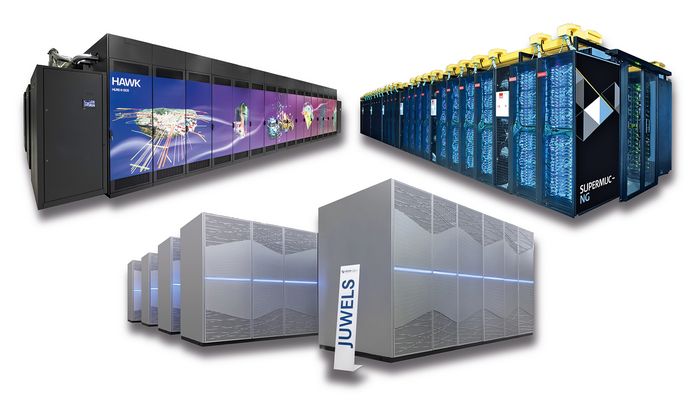PRESS RELEASES
Hawk Takes Flight and JUWELS is Boosted for the 24th GCS Large-Scale Call
Press Release 04/2020 –
The Gauss Centre for Supercomputing (GCS) Scientific Steering Committee just approved 16 new scientifically demanding simulation projects during its 24th Call for Large-Scale Projects. Representing scientific disciplines ranging from fluid mechanics to elementary particle physics, the projects all leverage Germany’s leading high-performance computing (HPC) resources to help solve some of humanity’s most challenging scientific challenges.
11 of this call’s awardees will be able to use their allocations on the two newest GCS supercomputers—system Hawk, located at the High-Performance Computing Center Stuttgart (HLRS) and the JUWELS Booster module available at the Jülich Supercomputing Centre (JSC). Both systems were installed through the course of 2020, and due to delays brought on due to the COVID-19 pandemic, came fully online in time for the 24th call. HLRS will be hosting 3 of the Large-Scale projects and JSC will host 8.
The remaining 5 projects will be running on HPC system SuperMUC-NG located at the Leibniz Supercomputing Centre (LRZ).
The 16 approved projects represent both long-time collaborators with the GCS facilities as well as new faces. Long-time collaborator and RWTH Aachen researcher Dr. Matthias Meinke received 780 million core hours on the Hawk system to explore methods for reducing noise in turbines as part of his project, “Analysis of noise reduction by porous material, particulate flows and hot gas ingress in turbine wheel spaces.” First-time GCS awardee Professor Claudia Draxl of the Humboldt Universität zu Berlin was awarded 48 million core hours on the SuperMUC-NG system for advanced condensed matter physics research in her project, “Composition and Structure of beta-Ga2O3(001) under Realistic (T, p) Conditions.” Professor Marcus Müller from the University of Göttingen received 9,884 EFLOP (for a detailed explanation of EFLOPS, click here) on the new JUWELS Booster system to study polymer design in his project, “The role of grain boundaries for the self-assembly of cylinder-forming copolymers into polymer membranes.”
“In the 24th call, we feel confident that the steering committee once again selected a diverse mix of highly challenging research projects representing a broad range of scientific disciplines and institutions,” said Dr. Claus-Axel Müller, Managing Director of GCS. “We are very happy to offer users new and old the chance to accelerate their respective research projects with our newest HPC systems, and will continue to provide intensive training and user support to ensure that these researchers spend more time solving scientific problems and less time navigating our systems.”
For a full list of awarded projects with the 24th GCS Large-Scale Call, please click here.
pdf version of this press release
About GCS Large-Scale Projects: In accordance with the mission of the Gauss Centre for Supercomputing, all scientists and researchers in Germany are eligible to apply for computing time on the petascale HPC systems of Germany’s leading supercomputing institution. Projects are classified as "large-scale" if they require more tif they require at least 100 Mcore-h on Hawk, 45,000 EFLOP on JUWELS, or 45 Mcore-h on SuperMUC-NG. These values correspond to 2% of the systems’ annual production in terms of estimated availability. Computing time on the GCS systems is allocated by the GCS Scientific Steering Committee to scientifically leading, ground-breaking projects which deal with complex, demanding, and innovative simulations that would not be possible without the GCS petascale infrastructure. The projects are evaluated via a strict peer-review process on the basis of the projects' scientific and technical excellence.
The GCS Calls for Large-Scale Projects application procedure and criteria for decision are described in detail here.
About GCS: The Gauss Centre for Supercomputing (GCS) combines the three national supercomputing centres HLRS (High-Performance Computing Center Stuttgart), JSC (Jülich Supercomputing Centre), and LRZ (Leibniz Supercomputing Centre, Garching near Munich) into Germany’s Tier-0/1 supercomputing institution. Together the three centres provide the largest and most powerful supercomputing infrastructure in all of Europe and serve a wide range of industrial and research activities across various disciplines. They also provide top-tier training and education for the national as well as the European High Performance Computing (HPC) community. GCS is the German member of PRACE (Partnership for Advanced Computing in Europe), an international non-profit association consisting of 26 member countries, whose representative organizations create a pan-European supercomputing infrastructure, providing access to computing and data management resources and services for large-scale scientific and engineering applications at the highest performance level.
GCS is jointly funded by the German Federal Ministry of Education and Research and the federal states of Baden-Württemberg, Bavaria and North Rhine-Westphalia. It has its headquarters in Berlin/Germany.
GCS PR Contact:
Regina Weigand (r.weigand@gauss-centre.eu)
November 6, 2020
